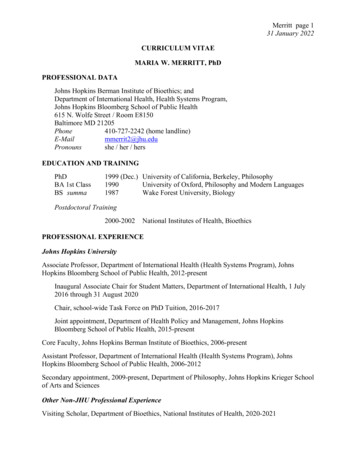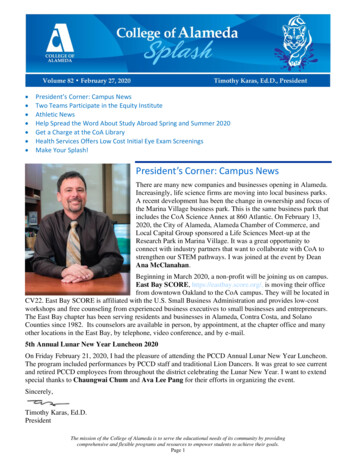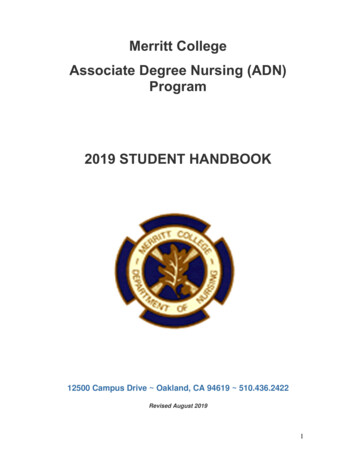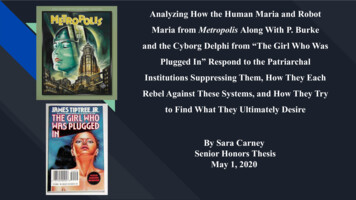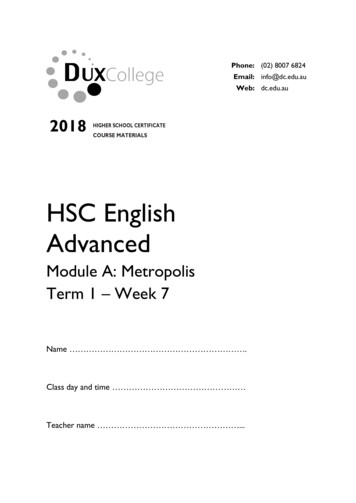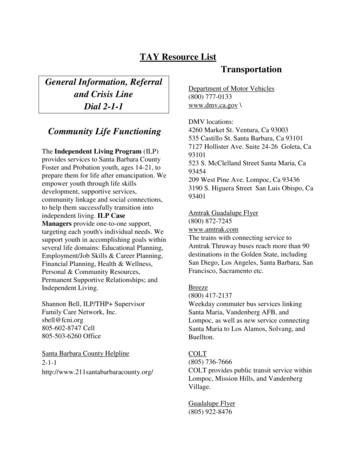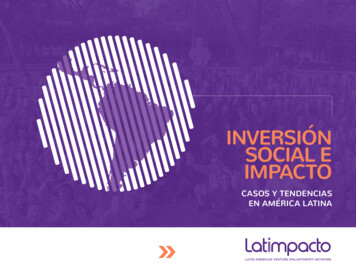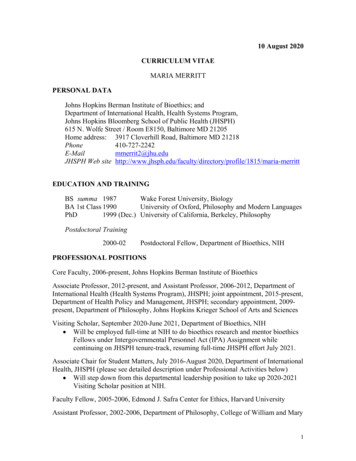
Transcription
10 August 2020CURRICULUM VITAEMARIA MERRITTPERSONAL DATAJohns Hopkins Berman Institute of Bioethics; andDepartment of International Health, Health Systems Program,Johns Hopkins Bloomberg School of Public Health (JHSPH)615 N. Wolfe Street / Room E8150, Baltimore MD 21205Home address: 3917 Cloverhill Road, Baltimore MD 21218Phone410-727-2242E-Mailmmerrit2@jhu.eduJHSPH Web site 5/maria-merrittEDUCATION AND TRAININGBS summa 1987Wake Forest University, BiologyBA 1st Class 1990University of Oxford, Philosophy and Modern LanguagesPhD1999 (Dec.) University of California, Berkeley, PhilosophyPostdoctoral Training2000-02Postdoctoral Fellow, Department of Bioethics, NIHPROFESSIONAL POSITIONSCore Faculty, 2006-present, Johns Hopkins Berman Institute of BioethicsAssociate Professor, 2012-present, and Assistant Professor, 2006-2012, Department ofInternational Health (Health Systems Program), JHSPH; joint appointment, 2015-present,Department of Health Policy and Management, JHSPH; secondary appointment, 2009present, Department of Philosophy, Johns Hopkins Krieger School of Arts and SciencesVisiting Scholar, September 2020-June 2021, Department of Bioethics, NIH Will be employed full-time at NIH to do bioethics research and mentor bioethicsFellows under Intergovernmental Personnel Act (IPA) Assignment whilecontinuing on JHSPH tenure-track, resuming full-time JHSPH effort July 2021.Associate Chair for Student Matters, July 2016-August 2020, Department of InternationalHealth, JHSPH (please see detailed description under Professional Activities below) Will step down from this departmental leadership position to take up 2020-2021Visiting Scholar position at NIH.Faculty Fellow, 2005-2006, Edmond J. Safra Center for Ethics, Harvard UniversityAssistant Professor, 2002-2006, Department of Philosophy, College of William and Mary1
PROFESSIONAL ACTIVITIESLeadership of Postdoctoral Programs in BioethicsCo-Associate Director, Greenwall Fellowship Program in Bioethics and Health Policy,Johns Hopkins University and Georgetown University, 2006-2012 (20% of total reportedeffort; program ended in 2012)Jointly administered by Johns Hopkins University and Georgetown University andfunded by the Greenwall Foundation, the Greenwall Fellowship was a highlyselective, internationally competitive postdoctoral training program in bioethics andhealth policy whose alumni are among the most talented, accomplished, andinfluential scholars in the field.We recruited Fellows primarily from philosophy, medicine, law, history, and thesocial sciences. My discipline-specific responsibilities included service as adesignated mentor for all Fellows who worked primarily in philosophy, a total ofeight from 2006 to 2012. They published fellowship-supported articles or bookchapters in peer-reviewed venues that include American Journal of Bioethics,American Journal of Public Health, Cambridge University Press, Developing WorldBioethics, Hypatia, Journal of Applied Philosophy, Journal of Philosophy, KennedyInstitute of Ethics Journal, Oxford University Press, Philosophy, Philosophy andPhenomenological Research, Public Reason, Southern Journal of Philosophy, andStanford Encyclopedia of Philosophy.My responsibilities were as follows: co-direct overall program administration;recruit, select, and orient postdoctoral Fellows; support Fellows in their academicdevelopment, professional formation and networking, placement in summerinternships, and pursuit of post-Fellowship employment; submit interim and annualreports to the President of the Greenwall Foundation; organize our seminar series forFellows (JHSPH 306.863.01); and invite guest faculty (external and internal) tospeak for the seminar. I was directly responsible for organizing approximately 16seminar sessions per year, half of which met in the Washington, DC area. EachFellow normally spent 2 years in full-time residence. All of our Fellows wereregistered as students at JHSPH through the Department of Health Policy andManagement.Faculty Leadership Team Member, Hecht-Levi Fellowship Program in Bioethics,2013-2016 (5% of total reported effort; stepped down in July 2016 upon becomingAssociate Chair for Student Matters in the JHSPH Department of International Health)Hosted by the Johns Hopkins Berman Institute of Bioethics and funded by a grantfrom the Hecht-Levi Foundation, this postdoctoral program is intended to helplaunch the careers of the next generation of bioethics scholars, creating 2-yearfunded research positions for at least 10 fellows through the decade beginning in2013. The Hecht-Levi Program is similar in many respects to its predecessor, theGreenwall Fellowship Program (above); likewise my responsibilities were similar.2
While on the Hecht-Levi Faculty Leadership Team, I served as a designated mentorfor two Fellows, whose fellowship-supported work was published in peerreviewed venues including American Journal of Bioethics, Bioethics, Global PublicHealth, Journal of Law, Medicine, & Ethics, Journal of Medical Ethics, OxfordUniversity Press, and Social Science & Medicine.University-Level Program DevelopmentProgram Officer, Johns Hopkins University Exploration of Practical Ethics (2015 –present; percentage of total reported effort varying with program cycle)The Johns Hopkins University (JHU) Exploration of Practical Ethics is a partnershipinvolving the Office of the President, the Office of the Provost, and the BermanInstitute of Bioethics. This program aims to stimulate innovative work in practicalethics by JHU faculty members across 11 University divisions (Applied PhysicsLaboratory, Berman Institute, Bloomberg School of Public Health, Carey BusinessSchool, Krieger School of Arts & Sciences, Peabody Institute, School of AdvancedInternational Studies, School of Education, School of Medicine, School ofNursing, and Whiting School of Engineering). My responsibilities as programofficer have included working intensively with investigators to develop theirproposals, coordinating the competitive review of proposals, and overseeing tworounds of funding with a total of 16 projects and a combined portfolio of 750,000. Project titles listed below indicate the breadth of work supported.For details, please see: 2018 funded projects Are We Asking the Right Questions about the Ethics of Autonomous VehicleTesting? Ethical Robotics: Implementing Value-Driven Behavior in Autonomous Systems Housing Our Story: Towards Archival Justice for Black Baltimore The Law of Unintended Consequences: Will the Implementation of CaliforniaSenate Bill 27 Impact Animal Health and Well-Being? Conducting Research on Commercially-Owned Online Spaces The Ethics of Preparedness in Humanitarian Disasters Determining the Number of Refugees to be Resettled in the United States: AnEthical and Human Rights Analysis2016 funded projects Altruism, Ethics, and Markets: A Behavioral and Neuroscientific ExperimentalStudy Unseen: Kalief Browder, Mass Incarceration, and Solitary Confinement Understanding and Addressing Moral Dilemmas of Sedentarization ofPastoralists: Practical Ethics of Mitigating Conflict Amongst Water and FoodResource-Constrained Populations in the Northern Kenya Semi-Arid Lands Environmental Ethics in American Life: An Anthropological Inquiry Transforming Moral Distress3
The Practical Ethics of University Community Engagement: Lessons from theLocal and GlobalUnderstanding the Ethics and Value of Higher Education: When is HighlySpecialized Training “Worth It”?Can God Stop the Next Financial Crisis? Prospects for a Consequentialist Ethicsof Islamic Financial EngineeringPractical Ethics for Future Leaders: Interdisciplinary Education Modules forInnovationJHPSH Institutional Review Board (IRB) ServiceMember, JHSPH IRB Full Committee, 2006-2017 (10% of total reported effort; steppeddown in 2017 to protect research time in light of departmental leadership responsibilities)The JHSPH IRB Full Committee reviews greater-than-minimal-risk research protocolsfrom across all the departments of the School. In 2010 I helped to develop anddisseminate the JHSPH Human Subjects Research Ethics Field Training Guide, which isstill in use, is available free of charge to the global public, and has so far been translatedinto Arabic, Bangla, Chinese, Dari, French, Khmer, Nepali, Spanish, Swahili, and tmental Academic LeadershipInaugural Associate Chair for Student Matters, July 2016-August 2020, Department ofInternational Health, JHSPH (20% total reported effort; stepping down to take full-timeposition as NIH Visiting Scholar 2020-2021)The department created this position in 2016 to enhance support for our students andto improve and sustain the quality of their academic experience. This charge entailsextensive operational leadership responsibilities related to academic progress, wellbeing, and quality of life for over 200 full-time students (for instance, 222 inacademic year 2019-20) enrolled across our ten degree programs, each with theirown degree program coordinators: four PhD programs; four Master of Science inPublic Health programs; one Master of Health Science program; and one now-legacydepartmental Doctor of Public Health program. Specific areas of responsibilityinclude student tuition and financial support, policies and procedures for students’program-related international travel, doctoral and master’s advisor training, andchairing the Admissions Committee. As Associate Chair for Student Matters, I alsoserve ex officio on the departmental Leadership Team (with the Chair and five otherAssociate Chairs), Steering Committee, Curriculum & Credentials Committee, andCOVID-19 Response Team, and I’m co-leading the launch team for ourdepartmental Working Group on Inclusion, Diversity, Anti-Racism, and Equity(IDARE), pending appointment of a dedicated IDARE Associate Chair.4
Participation on Advisory PanelsMember, Governing Board (2020-present), Community Concerts at Second, an annualconcert series presenting world-class music free to x.htmlMember, planning committee (Nov. 2019-Feb. 2020), U.S. National Academies ofSciences, Engineering, and Medicine workshop: An Examination of Emerging BioethicalIssues in Biomedical Research. This NIH-sponsored workshop was held to discusspotential ethical issues that may arise from new and emerging trends in biomedicalresearch and society. Workshop information and report are accessible -biomedical-research-a-workshopParticipant, Joint Planning Meeting, Oxford Wellcome Centre-Johns Hopkins BermanInstitute Collaborative Bioethics Research & Training Program, London, 2 August 2019.Stage 1 Reviewer (2016), NIH International Research Ethics Education and CurriculumDevelopment Award (PAR 16-081 - FIC R25)Member (2014-16), Wake Forest University Reynolds Scholarship Committee (selectionof high school students for full academic scholarships to college)Co-Chair (2010-11), workgroup on Ethical Reasoning and Professional Practice domainfor Global Health Core Competency Development Project, Association of Schools ofPublic Health (ASPH)Member (2009-13), Wake Forest University College Board of VisitorsMember (28 May 2009), Global Health Council Research Symposium Advisory PanelConsultationsInvited workshop participant (June 2-3, 2020, postponed because of COVID-19pandemic), REACH (Resilience, Empowerment, and Advocacy in Women’s andChildren’s Health Research) Workshop: “Building the evidence base to inform the ethicsof research with vulnerable populations of women, children, and families”, hosted byKEMRI (Kenya Medical Research Institute) Wellcome Trust Research Programme inKilifi, Kenya.Invited workshop participant (Dec. 10-11, 2019), Second meeting of the WHO WorkingGroup on the role of vaccines against antimicrobial resistance (VAC-AMR); workshopco-convened by WHO, the Bill and Melinda Gates Foundation (BMGF), the Center forDisease Dynamics, Economics & Policy (CDDEP), and the Wellcome Trust. Workinggroup aims to better define the role of vaccines against AMR and to determine thepriorities through which the impact of vaccines against AMR can be strengthened. Myrole has been to provide expertise on assessing equity and social justice impacts within avalue attribution framework (VAF) for evaluating vaccines against AMR.5
Invited workshop participant (Mar. 26-26, 2018), Examining the Equity of Global HealthInterventions Using Infectious Disease Transmission Models: Informing the ReferenceCase for Economic Evaluation in Global Health; workshop co-convened by the TBModelling and Analysis Consortium (TB-MAC) and the Centre for the MathematicalModelling of Infectious Diseases at the London School of Hygiene & Tropical Medicine;funded by the International Decision Support Initiative Scale up Project (Bill andMelinda Gates Foundation Grantee).Invited member of team convened by NIH Health Care Systems Research Collaboratory(2014-15) to produce collection of articles on the ethics of pragmatic clinical trials.Invited workshop participant (Sep. 22- 23, 2014), Social, Behavioral and Ethical Issues inResearch on HIV Cure; hosted by Division of AIDS, National Institute of Allergy andInfectious Diseases (NIAID), National Institutes of HealthMember (2011-2014), Methodological Task Force, Eradication Investment Cases forOnchocerciasis, Lymphatic Filariasis and Human African Trypanosomiasis, SwissTropical and Public Health Institute (Swiss TPH); project funded by Bill and MelindaGates Foundation; PI Fabrizio Tediosi, Co-PI Marcel TannerInvited workshop participant (Dec. 15-16, 2011), Post-Trial Access to Trial Drugs: Legal,Ethical and Practical Issues; workshop included consultation on draft document for UKNational Research Ethics Service; hosted by Brocher Foundation, Geneva, SwitzerlandInvited workshop participant (Oct. 31- Nov. 1, 2011), Bioethics Challenges in HIV/AIDSResearch; hosted by Division of AIDS, National Institute of Allergy and InfectiousDiseases (NIAID), National Institutes of HealthConsultant (Feb. 10 - Dec. 31, 2010), Institute of Medicine (IOM) Committee onEnvisioning a Strategy to Prepare for the Long-Term Burden of HIV/AIDS: AfricanNeeds and US Interests; contributed to chapter on ethical decision-making capacity intext of Consensus Report: IOM, Preparing for the Future of HIV/AIDS in Africa: aShared Responsibility (Washington, DC: The National Academies Press, 2011)Invited workshop participant (Dec. 9-10, 2010), Development of an EradicationInvestment Case Methodology; sponsored by Ernst Strüngmann Forum and the Bill andMelinda Gates Foundation, Boston MA; served as one of 16 contributors to text ofresulting guidelines (lead authors Walker D and Lupp J), Guide to Preparing anEradication Investment Case, as posted on a dedicated and freely accessible web site:http://eic-guidelines.org/HONORS AND AWARDSHonorsAccepted into 2020 Brocher Summer Academy in Global Population Health, “Healthy,Wealthy, and Wise: The Ethics of Health Valuation” (postponed because of COVID-19pandemic)6
Accepted into 2018-19 national leadership training program sponsored by GreenwallFaculty Scholars Program in BioethicsJHSPH Student Assembly Special Recognition Award for Outstanding Commitment toStudent Success, 2017: ted by JHSPH and selected to participate in Johns Hopkins Medicine LeadershipProgram for Women Faculty, 2014-15Delta Omega Honorary Society in Public Health, Alpha Chapter, inducted May 2013Recognition for teaching excellence as principal instructor of JHSPH course, Ethics ofPublic Health Practice in Developing Countries604.603.86 – online: 2nd term 2018-19221.616.81 – online: 4th term 2016-17, 2017-18221.616.01 – classroom; no longer offered after 2016-17: 4th term 2016-17,2015-16, 2014-15, 2012-13, 2011-12AwardsGreenwall Faculty Scholars Program in Bioethics, 2009-12, career development award.Offered to only a few candidates per year under intense national competition, this isthe premier U.S. career development award in the field of bioethics. It is meant “toenable junior faculty members to carry out innovative bioethics research” that “goesbeyond current work in bioethics to help resolve pressing ethical issues in clinicalcare, biomedical research, and public rogramFaculty Fellow, 2005-06, Edmond J. Safra Center for Ethics, Harvard UniversityThis internationally competitive fellowship existed from 1987 to 2009. “Outstandingteachers and scholars from Harvard and other leading institutions of higher educationthroughout the world joined the Center to pursue a year of study designed to developtheir competence to teach and write about ethical issues in the professions and inpublic life more lowship-programChancellor’s Dissertation-Year Fellow, 1998-99, UC BerkeleyRhodes Scholar, 1987-90, Oxford University (University College)Mellon Fellow for Undergraduate Research in Psychiatry, 1987, Western PsychiatricInstitute and Clinic, PittsburghReynolds Scholar, 1983-1987 Wake Forest University (4-year academic scholarship withfull tuition, room, and board)7
Named LectureshipsPurdue University Lectures in Ethics, Policy, and Science, “Global Public HealthResearch: Questions about Researchers’ Responsibilities to Benefit Participants,” 13April 2012PUBLICATIONSJournal articles (signifies peer review)* designates co-author as current JHU student/fellow or recent alumna/alumnus attime of publication37. Geller G, Steinman C, Caldwell M, Goldberg H, Hanlon C, Wonnell T, MerrittMW (senior author), “Development and Validation of a Capacity for Wonder (CfW)Scale for Use in Educational Settings,” Journal of Psychoeducational Assessment(2020: in press): https://doi.org/10.1177/073428292091872736. Dowdy DW, Zwerling AA, Stennett A, Searle A, Dukhanin V, Taylor HA,Merritt MW (senior and corresponding author), “Measuring Stigma to Assess theSocial Justice Implications of Health-Related Policy Decisions: Application to NovelTreatment Regimens for Multidrug-Resistant Tuberculosis,” Medical DecisionMaking Policy & Practice (2020): 5(1): https://doi.org/10.1177/238146832091523935. Merritt MW, Sutherland CS, Tediosi F, “Ethical Considerations for GlobalHealth Decision-Making: Justice-Enhanced Cost-Effectiveness Analysis of NewTechnologies for Trypanosoma brucei gambiense,” Public Health Ethics (2018):phy013, https://doi.org/10.1093/phe/phy01334. Geller G, *Caldwell M (recent JHSON alumna), Merritt MW, “The Cultivationof Wonder in the Premedical Learning Environment: Nurturing Ethical Character inthe Early Formation of Health Professionals,” Journal of College and Character(2018): 19(3): 229-23533. *Paul A (recent Hecht-Levi Fellow alumna), Merritt MW, Sugarman J,“Implementing Post-Trial Access Plans for HIV Prevention Research,” Journal ofMedical Ethics (2018): 44(5):354-358.32. *Harrison KL (recent JHSPH Bioethics PhD alumna), Taylor HA, Merritt M,“Action Guide for Addressing Ethical Challenges of Resource Allocation withinCommunity-Based Healthcare Organizations,” Journal of Clinical Ethics (2018):29(2): 124-13831. Dukhanin VA, Searle A, Zwerling A, Dowdy DW, Taylor HA, Merritt MW(corresponding author), “Integrating Social Justice Concerns into EconomicEvaluation for Healthcare and Public Health: A Systematic Review,” Social Science& Medicine (2018): 198: 27-3530. *Sripad P (recent JHSPH IH PhD alumna), Ozawa S, Merritt MW, Jennings L,Kerrigan D, Ndwiga C, Abuya T, Warren C, “Exploring Meaning and Types of Trust8
in Maternity Care in Peri-Urban Kenya: a Qualitative Cross-Perspective Analysis,”Qualitative Health Research (2018): 28(2): 305-32029. Zwerling A, Dowdy DW, von Delft A, Taylor H, Merritt M, “IncorporatingSocial Justice and Stigma in Cost-Effectiveness Analysis: Drug-ResistantTuberculosis Treatment,” International Journal of Tuberculosis and Lung Disease(2017): 21(11): S69–S74 (Supplement: TB Stigma)28. *Schuh HB (recent JHSPH IH PhD alumna), Merritt MW, Igusa T, Lee B,Peters DH, “Examining the Structure and Behavior of Afghanistan’s RoutineChildhood Immunization System Using System Dynamics Modeling,” InternationalJournal of Health Governance (2017): 22 (3): 212-22727. *Krubiner CB (recent JHSPH Bioethics PhD alumna), Merritt MW, “WhichStrings Attached: Ethical Considerations for Selecting Appropriate Conditionalitiesin Conditional Cash Transfer Programs,” Journal of Medical Ethics (2017): 43: 16717626. *Pratt B (recent Hecht-Levi alumna), Merritt MW, Hyder AA, “Towards DeepInclusion for Equity-Oriented Health Research Priority-Setting: A Working Model,”Social Science & Medicine (2016): 151:215-22425. Merritt MW, Katz J, Mojtabai R, West KP, Jr., “Referral of ResearchParticipants for Ancillary Care: A Planning Tool for Community-Based PublicHealth Research,” Public Health Ethics (2016): 9(1):104-12024. Smalley JB, Merritt MW, Al-Khatib SM, McCall D, Staman KL, StepnowskyC, “Ethical Responsibilities Toward Indirect and Collateral Participants in PragmaticClinical Trials,” Clinical Trials (2015): 12(5):476–48423. *Bailey TC (Hecht-Levi Fellow), Merritt MW, Tediosi F, “Investing in Justice:Ethics, Evidence, and the Eradication Investment Cases for Lymphatic Filariasis andOnchocerciasis,” American Journal of Public Health (2015): 105(4):629-63622. *King K (recent Greenwall post-doc fellow alumna), Kolopack P, Merritt MW,Lavery JV, “Community Engagement and the Human Infrastructure of Global HealthResearch,” BMC Medical Ethics (2015): 15(1):8421. *Krubiner CB (JHSPH Bioethics PhD student), *Syed RH (recent JHUundergrad alumnus), Merritt MW, “Guidance on Health Researchers’ AncillaryCare Responsibilities in Low-Resource Settings: the Current InstitutionalLandscape,” IRB: Ethics and Human Research (2015): 37(2):12-1920. *Holzer J, (recent JHSPH Bioethics PhD alumna), *Ellis L (JHSPH BioethicsPhD student), Merritt MW, “Why We Need Community Engagement in MedicalResearch,” Journal of Investigative Medicine (2014): 62(6): 851-85519. Labrique AB, Kirk GD, Westergaard RP, Merritt MW, "Ethical Issues inmHealth Research Involving Persons Living with HIV/AIDS and Substance Abuse,"9
AIDS Research and Treatment (2013), vol. 2013, Article ID 189645, 6 pages.doi:10.1155/2013/18964518. *Brown B (recent JHSPH IH PhD alumnus), Merritt MW, “A Global PublicIncentive Database for Human Subjects Research,” IRB: Ethics and HumanResearch 35(2). (March-April 2013): 14-1717. Merritt MW, Taylor HA, “Responsibilities to Plan for Ancillary Care PoseEthical Challenges for Nutrition Research in the Community Setting,” Journal ofNutrition 142 (2012): 1787-179016. Dowdy DW, Gounder CR, Corbett EL, Ngwira LG, Chaisson RE, Merritt MW,“The Ethics of Testing a Test: Randomized Trials of the Health Impact of DiagnosticTests for Infectious Diseases,” Clinical Infectious Diseases 55 (2012): 1522-152615. Taylor HA, Merritt MW, "Provision of Community-Wide Benefits in PublicHealth Intervention Research: The Experience of Investigators Conducting Researchin the Community Setting in South Asia," Developing World Bioethics 12 (3) (2012):157-16314. Merritt MW, “Health Researchers’ Ancillary Care Obligations in Low-ResourceSettings: How Can We Tell What Is Morally Required?” Kennedy Institute of EthicsJournal 21 (4) (2011): 311-34713. Taylor HA, Merritt MW, Mullany LC, “Ancillary Care in Public HealthIntervention Research in Low-resource Settings: Researchers’ Practices andDecision-Making,” Journal of Empirical Research on Human Research Ethics(JERHRE) 6 (2011): 73-8112. Labrique AB, Merritt MW, Bartlett LA, “Research Enrollment and InformedConsent,” peer-reviewed letter, JAMA 306 (2011): 26611. Merritt MW, Labrique AB, Katz J, Rashid M, West KP, Jr., Pettit J, “A FieldTraining Guide for Human Subjects Research Ethics,” PLoS Medicine (2010); 7(10):e1000349. doi:10.1371/journal.pmed.1000349A joint WHO/PLoS panel selected this article from across the PLoS journalsfor inclusion in a special collection to support key messages in the World HealthReport 2012, No Health Without Research. The article is linked from theCollection homepage under the category Health in Action. Accessible 10. Merritt MW, Taylor HA, Mullany LC, “Ancillary Care in Community-BasedPublic Health Intervention Research,” American Journal of Public Health 100(2010): 211-2169. Hyder AA, Merritt MW, “Ancillary Care for Public Health Research inDeveloping Countries” JAMA 302(4) (2009): 429-4318. Merritt MW, “Aristotelean Virtue and the Interpersonal Aspect of EthicalCharacter,” Journal of Moral Philosophy 6 (2009): 23-4910
This article was selected for inclusion in an edited volume featuring the bestwork published in the Journal of Moral Philosophy (pp. 207-235 in Brook T(ed.), Ethics and Moral Philosophy, Brill 2011).7. Hyder AA, Merritt M, Ali J, Tran N, Subramaniam K, Akhtar T, “IntegratingEthics, Health Policy and Health Systems in Low- and Middle-Income Countries:Case Studies from Malaysia and Pakistan,” Bulletin of the WHO 86 (2008): 606-6116. Participants in the 2006 Georgetown University Workshop on theAncillary-Care Obligations of Medical Researchers Working in DevelopingCountries (Brownsword R, Cermak A, Chaisson R, Clayman MD, Corr PB,DeCherney S, Grady C, Higgs ES, Kumar NK, Lie R, Merritt M, Molyneux M,Petros B, Richardson HS, Sugarman J), “The Ancillary-Care Obligations of MedicalResearchers Working in Developing Countries,” PLoS Medicine 5(5) (2008):e90.doi:10.1371/journal.pmed.00500905. Merritt M, “Bioethics, Philosophy, and Global Health,” Yale Journal of HealthPolicy, Law, and Ethics VII (2007): 273-3174. Merritt M, Grady C, “Reciprocity and Post-trial Access for Participants inAntiretroviral Therapy Trials,” AIDS 20 (2006): 1791-1794In a 2011 systematic review of 75 articles mentioning reasons why post-trialaccess to trial drugs either should be or need not be ensured to researchparticipants, this article was one of 2 publications explicitly commended asexcellent (Sofaer and Strech, Public Health Ethics 4 (2): 160-184; p. 177).3. Merritt M, “Moral Conflict in Clinical Trials,” Ethics 115 (2005): 306-330Ethics is one of the two most highly selective and influential journals in moralphilosophy. This article was my first publication in research ethics. It provides asustained critical discussion of strategies for resolving moral conflicts betweenconsiderations of science and subjects’ welfare in clinical trials.2. Merritt M, “Virtue Ethics and Situationist Personality Psychology,” EthicalTheory and Moral Practice 3 (2000): 365-383This article, my first publication in moral psychology, is one of only 10 articlesby contemporary philosophers to be selected for inclusion (along with 29other pieces by psychologists and ancient and modern philosophers such asPlato, Aristotle, Hobbes, Hume, Kant, and Nietzsche) in the anthology MoralPsychology: Historical and Contemporary Readings (ed. Nadelhoffer T,Nahmias E, and Nichols S, Wiley-Blackwell 2010; pp. 224-230).1. McEvoy JP, Freter S, Merritt M, Apperson LJ, “Insight about Psychosis amongOutpatients with Schizophrenia,” Hospital and Community Psychiatry 44(1993):883-4Articles, Editorials and other publications not peer reviewed11. Siegel AW, Merritt MW, “Foundations of Public Health Ethics: An Overview”(overview of section entitled, “Conceptual Foundations, Ethical Tensions, and11
Ethical Frameworks in Public Health”), in Mastroianni A, Kahn JP, and Kass N,Oxford Handbook of Public Health Ethics, Oxford University Press (in press)10. Merritt MW, Hyder AA, “Ethics of Health Systems: New Explorations”(overview of section entitled, “Ethics of Health Systems”), in Mastroianni A, KahnJP, and Kass N, Oxford Handbook of Public Health Ethics, Oxford University Press(in press)9. Mello M, Merritt M, Halpern S, “Supporting Those Who Go to Fight Ebola,”guest editorial, PLoS Medicine, 2015: 12(1): 7818. Pratt B, Merritt MW (2015), E-Learning Course on Ethics of Ancillary Care inResearch, published on The Global Health Training Centre online rg/elearning/short-courses/ancillary-care/7. Syed RH* (recent JHU undergraduate alumnus) and Merritt MW (2013), TopicsPage on Ancillary Care, posted at The Global Health Network online topics/ancillary-care/6. Contributed to chapter on ethical decision-making capacity in text of Institute ofMedicine Consensus Report, Preparing for the Future of HIV/AIDS in Africa: aShared Responsibility (Washington, DC: The National Academies Press, 2011)produced by the IOM Committee on Envisioning a Strategy to Prepare for the LongTerm Burden of HIV/AIDS: African Needs and US Interests5. Contributed to text of Guide to Preparing an Eradication Investment Case (leadauthors Walker D and Lupp J), as posted on a dedicated and freely accessible website: http://eic-guidelines.org/; product of 2010 workshop sponsored by the ErnstStrüngmann Forum and the Bill and Melinda Gates Foundation.4. Contributed as a domain workgroup co-chair to Global Health Competency Modelfor American Schools of Public Health, released 31 October, 20113. Merritt M, “Global Health Research and Professional Ethics: Ancillary Care forResearch Participants,” Maryland Medicine Summer 2007: 32-332. Merritt M, “The Challenge of Clinical Empathy,” Journal of Clinical Ethics 14(2003): 283-2851. Merritt M, “Emotional Reasoning,” (book review) Hastings Center ReportSep/Oct 2002, 32(5): 45-46Chapters
MARIA MERRITT PERSONAL DATA Johns Hopkins Berman Institute of Bioethics; and Department of International Health, Health Systems Program, Johns Hopkins Bloomberg School of Public Health (JHSPH) 615 N. Wolfe Street / Room E8150, Baltimore MD 21205 Home address: 3917 Cloverhill Road, Baltimore MD 21218 Phone 410-727-2242
